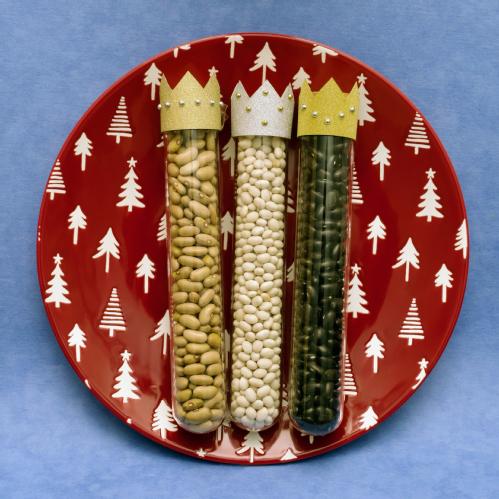Press Releases
“We three beans”: Capulet, Godiva and Olivia beans on sale in the New Year

Godiva, Capulet and Olivia (left to right) are new varieties of the nation’s favourite pulse, common beans, developed and grown in the UK. The trio are set to go plastic-free in the new year when they go on sale in local zero-waste stores.
The UK Registered beans (URBeans) mark an important milestone, kicking-off the celebrations of 75 years of horticultural research at the site of the National Vegetable Research Station, now Warwick Crop Centre, at the University of Warwick Innovation Campus, near Stratford-upon-Avon.
The URBeans are named after iconic figures from the Stratford and Coventry areas. These common beans represent the latest efforts of the University of Warwick’s Eric Holub, in his work to to diversify British cooking. He’s starting close to home - in and around Warwickshire.
- Capulet Bean - Inspired by the Capulet family from Shakespeare's "Romeo and Juliet," this is possibly one of the most famous beans in the UK now, as it’s recently been tinned for the first time in a baked-bean style.
- Godiva Bean – This blonde bean has taken its name from Coventry’s Lady Godiva and has recently been prepared by cooks and taste-tested by kids in six Midlands primary schools as part of BeanMeals, a ‘Transforming UK Food System’ research project.
- Olivia Bean - Inspired by the enchanting character from Shakespeare's "Twelfth Night."

A dry bean mix of Godiva and Capulet will go on trial sale in the New Year from Zero Store shops in Stratford-on-Avon and Leamington Spa. Zero Store launched at the height of the pandemic and provide a friendly and educational place to buy everyday grocery items, from dry food ingredients to cleaning products, using your own containers and helping you reduce plastic waste.
A third of the dry food ingredients are sourced within 25 miles of the shops, making it an ideal place to launch new common bean varieties from Warwick’s innovation campus in Wellesbourne.
Professor Eric Holub said “To better serve public health, we need to inspire even closer links between cooks and British farmers. Our traditional varieties of fresh produce, cereals and pulses are essential ingredients but not sufficient.”
“We need more diversity of plant fibre to improve our diets. These new common bean varieties are exciting because they will help nurture new cooking traditions, starting across the Midlands, with a touch of local history and supporting sustainable agriculture using British seed, soil and sunshine.”
Owner of Zero Store, Charlie Demetriou said: “When Eric first mentioned this to me last year, I was super keen to be a part of it. It’s been a tricky 18 months for small retailers, so we are delighted to be part of such an exciting project whilst appreciating the years of work that have gone into it.”
“Cooking and processing your own dry beans, you can save yourself a tonne of money. I love the fact they’ve gone with those names, too. It ties it in to the local area, also it’s fun and memorable, I think it’ll help customers to relate to them.”
Dr Rosanne Maguire (BeanMeals UofW research fellow) said: “Our local community will hopefully embrace cooking with Godiva and Capulet in the new year, and discover the versatility of such humble ingredients. Feedback from cooks will help us to scale-up production with farmers and to build on our engagement with local community centres and schools.”
Current supply of the Godiva-Capulet mix is expected to sell out quickly, however, the initial sales will inform planning to expand availability from the 2024 harvest, and to launch sale of Olivia at end of the year.
